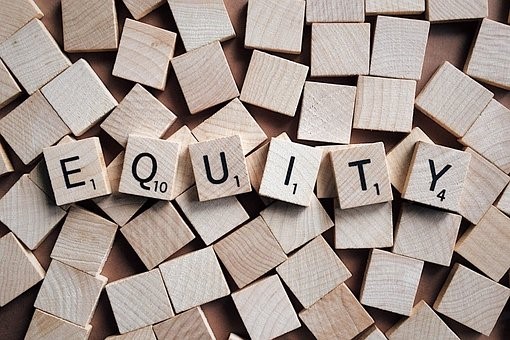“You keep using that word, I do not think it means what you think it means.” Inigo Montoya
During the 1987 movie, The Princess Bride, Sicilian boss Vizzini “repeatedly describes the unfolding events as ‘inconceivable.’ After Vizzini attempts to cut a rope the Dread Pirate Roberts is climbing up, he yells out that it was inconceivable that the pirate did not fall.” It is at this point that the swordsman Montoya utters the now-famous line quoted above.
The use of the word “Equity” has become the new “inconceivable” – that is, most people who use the term do not really know what it means. Worst – many do not understand that the use of “Equity” principles is un-American, and patently unconstitutional.
According to the National Association of Colleges and Employers, “(t)he term ‘equity’ refers to fairness and justice and is distinguished from equality: Whereas equality means providing the same to all, equity means recognizing that we do not all start from the same place and must acknowledge and make adjustments to imbalances. The process is ongoing, requiring us to identify and overcome intentional and unintentional barriers arising from bias or systemic structures.”
Then there is the definition provided by George Washington University; “Equity recognizes that each person has different circumstances and allocates the exact resources and opportunities needed to reach an equal outcome…Equity is a solution for addressing imbalanced social systems. Justice can take equity one step further by fixing the systems in a way that leads to long-term, sustainable, equitable access for generations to come.”
When described in this fashion, Equity sounds like a wonderful idea – after all, who wouldn’t want to “overcome barriers” and “address imbalance!”
But then, we encounter this definition from Charles Lipson of the University of Chicago; “Equality means equal treatment, unbiased competition and impartially judged outcomes. Equity means equal outcomes, achieved if necessary by unequal treatment, biased competition and preferential judging. Those who push for equity…challenge America’s bedrock principle that people should be treated equally and judged as individuals, not as members of groups… (o)nly a powerful central government could impose the intensive—and expensive—programs of social intervention, ideological re-education and economic redistribution (necessary to achieve Equity). Only an intrusive bureaucracy could specify the rules for every business, public institution and civic organization (and) (i)f the results fall short, as they inevitably would, the remedy is obvious: more money, more rules and more indoctrination.”
In fact, according to leftist commentator Robert Kuttner, “change will come only with massive restructuring of the power relations across labor, capital, and government, as well as class-based coalitions against racism.”
Does this “massive restructuring,” “ideological re-education” and “economic redistribution” sound compatible with what has generally come to be known as “the American way?” According to Harvard University Professor Martha Minow, “(t)he terms ‘equality’ and ‘equity’ have become weapons in polarized political arguments…(t)he political volley over words neglects and obscures decades of litigation, policy, and academic work in both American law and comparative law. The U.S. Constitution prohibits government denial of ‘equal protection’ of the laws; state and federal statutes guard against discrimination on the basis of individual characteristics (e.g., race, gender, disability, age, sexual orientation or identity). The relevant state or federal authority does not use the term ‘equity’…courts have ruled that “classification” of individuals on the basis of certain personal characteristics (including race, gender, and religion) requires the most skeptical scrutiny.”
It is instructive at this point to read the actual words of the 14th Amendment to the United States Constitution; “No State shall make or enforce any law which shall abridge the privileges or immunities of citizens of the United States; nor shall any State deprive any person of life, liberty, or property, without due process of law; nor deny to any person within its jurisdiction the equal protection of the laws.” Notice this Amendment reads “equal protection” – not “equitable.”
The analysis concludes tomorrow
Judge John Wilson (ret.) served on the bench in NYC
